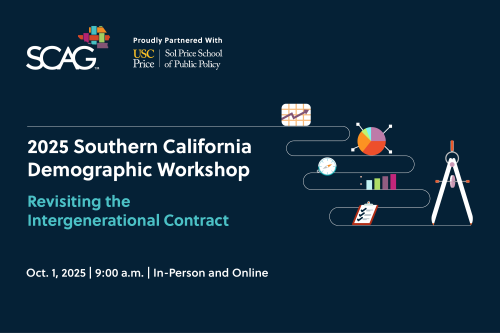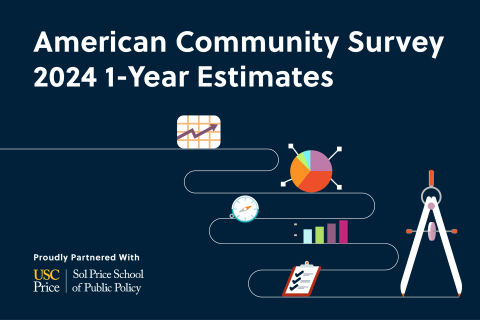2025 Southern California Demographic Workshop: Revisiting the Intergenerational Contract

OCT. 1
9 a.m.
In Person & Online
The 2025 Southern California Demographic Workshop gathered more than 350 attendees to discuss the future of Southern California in a new era of slower population growth. This 36th annual event, presented by SCAG and the USC Sol Price School of Public Policy at the SCAG main office in downtown Los Angeles, featured panels, roundtable discussions, and a keynote speaker.
Agenda
TIME | AGENDA |
|---|---|
9:00 a.m. | WELCOME & OPENING REMARKS
|
9:20 a.m. | DEMOGRAPHIC CHECK-UP This annual panel shares and interprets the latest data and insights on the region and state’s demographics. The California Department of Finance will present the latest long-term demographic projections for California and its counties. SCAG will also report on the recently released 2024 American Community Survey demographic and socioeconomic indicators for the region.
|
10:10 a.m. | LIFECYCLE SHARING: A TIMELESS SOCIAL CONTRACT Traditionally, young people benefit from their families’ and society’s investments in their future productivity, older people live off savings and pensions they’ve previously accrued, and the middle life stages feature the highest productivity. This arrangement reflects a longstanding, shared understanding of how to allocate resources across the human life cycle. However, this arrangement is not constant, and changes in population growth, age structure, family dynamics, and public finance all affect how resources are shared across age groups in a society. In Southern California, the importance of other peoples’ children has increased, and an elevated cost of living affects life stages asymmetrically. Panelists will discuss the concept of lifecycle sharing, specifically the United Nations-supported National Transfer Accounts project.
|
11:20 a.m. | THE ROLE OF IMMIGRATION IN SOUTHERN CALIFORNIA'S WORKFORCE While Southern California's cultural image may still be the midcentury idea of mass migration from eastern states, the region has seen a steady outflow of residents to other states and regions and a steady inflow of immigrants from Latin America and Asia in the last three to four decades. With fertility continuing to decline and a population continuing to age, the labor needs of the region are on full display for a region with a 30 percent foreign-born population. Notably, the current federal and global environments—as well as declining global population growth—pose severe challenges for intergenerational economic and community integration in the region. Panelists will bring perspectives from healthcare, agriculture, labor, and community organizing to understand the present challenge and available responses to strengthen lifecycle sharing despite these headwinds.
|
12:15 p.m. | LUNCH |
1:00 p.m. | KEYNOTE ADDRESS Professor Myers’s keynote will address how the established social contract in California is giving way under forces of slower population growth, stable integration of immigrants, rapid decline in fertility, and a growing retirement-age population. These new population growth realities of the 21st century encourage an emergency social contract that can promise benefits for all in the decades ahead. Embracing the demographic changes through intergenerational “lifecycle sharing” can contribute to California’s future economic success.
|
1:45 p.m. | EVENT WRAP UP |
Keynote Speaker
Dowell Myers
Professor and Director, Population Dynamics Research Group, USC Sol Price School of Public Policy

Dowell Myers, Ph.D., is a specialist in urban growth and societal change, with expertise as a planner and urban demographer. Professor Myers partnered with SCAG in 1990 to host the Southern California Demographic Workshop and has co-hosted the annual event ever since.
Professor Myers has been an advisor to the Bureau of the Census and authored the most widely referenced work on census analysis, Analysis with Local Census Data: Portraits of Change (Academic Press, 1992). A longtime student of housing and demographics, his demographic work has emphasized immigration and generations, including the award winning 2007 book, Immigrants and Boomers: Forging a New Social Contract for the Future of America. His recent research projects focus on solving housing shortages, as well as public narratives about generational change and immigration, all of which are evolving through time.
Professor Myers has also been an academic fellow of the Urban Land Institute and a member of the Governing Board of the Association of Collegiate Schools of Planning. In 2017 he received the Dale Prize for excellence in planning scholarship. He is also one of two recipients of the Haynes Award for Research Impact, presented by the John Randolph Haynes and Dora Haynes Foundation.

SCAG has published a new demographic analysis based on the U.S. Census Bureau’s 2024 American Community Survey (ACS) one-year estimates: “Highs, Lows, and Shocks: Key Housing and Economic Trends in Southern California.” Published during the 2025 Southern California Demographic Workshop, hosted by SCAG and the USC Sol Price School of Public Policy on Oct. 1, the report uses ACS data to compare trends in the region to California and the United States across a range of housing and economic topics.
Drawing on nearly two decades of annual ACS data, the report highlights how the SCAG region and its six counties compare with state and national trends across key indicators such as housing affordability, workforce patterns, and economic resilience.
Download Highs, Lows, and Shocks: Key Housing and Economic Trends in Southern California.
Highlights
Expert insights at the 2025 Demographic Workshop held on Oct. 1, 2025, included region-specific details from American Community Survey data and a discussion about how the latest demographic trends are influencing the traditional “intergenerational contract”—how groups in society rely on one another across generations and between lifecycle stages.






















